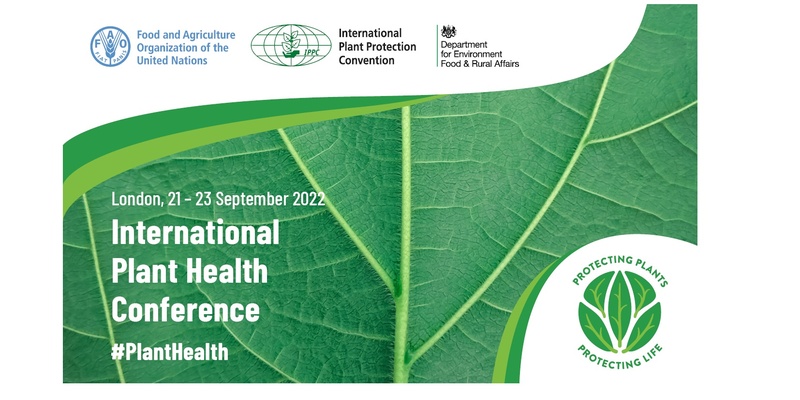World’s first International Plant Health Conference addressed critical challenges in plant health
Posted on Wed, 28 Sep 2022, 11:47

Rome, 28 September – The world’s leading authorities on plant health came come together for the world’s first ever International Plant Health Conference (IPHC), co-organized by FAO, the Secretariat of the International Plant Protection Convention (IPPC) and the Department of Environment, Food and Rural Affairs (DEFRA) of the United Kingdom.
More than 500 policymakers, academics and experts from more than 74 countries convened on 21-23 September at the Queen Elizabeth II Conference Centre in London to address current and future plant health challenges, including food security, the impacts of climate change, environmental protection, facilitating safe trade, and new pest and disease pathways, such as e-commerce.
“Plant health and biosecurity are fundamental to life on Earth. Plants provide 80 percent of the food we eat and 98 percent of the oxygen we breathe. In a changing climate, ensuring their continued health and vitality will be critical to safeguarding food security, safe international trade and a thriving natural environment for future generations.’’, said Nicola Spence, United Kingdom Chief Plant Health Officer.
“The first International Plant Health Conference is an important advancement of our work in protecting plants from pests and diseases. To achieve our goals and contribute to food security, protect the environment and facilitate safe trade, I encourage donors and governments to invest in building plant health capacity, research and outreach. Let us keep our collective efforts going and take bold action to sustain the momentum. When we protect plants, we protect our health and our lives.’’ said Osama El-Lissy, Secretary, International Plant Protection Convention.
Protecting plant health is critical in achieving the United Nations Sustainable Development Goals (SDGs). Healthy plants contribute to achieving food security for all (SDG 2 Zero Hunger) and promotes responsible food consumption and production (SDG 12). Protecting plants helps protect biodiversity and the environment from the impact of plant pests (SDG 13 and 15), and facilitates safe trade, in turn providing decent job opportunities and boosting economic growth (SDG 8). The International Plant Health Conference supports the delivery of the IPPC Strategic Framework 2020-2030.
More than 120 speakers across 20 sessions and delegates shared knowledge and discussed global scientific, technical and regulatory issues, alongside actions to tackle these existential threats to our society, economy and environment. More than 600 viewers followed the conference via webcast during different sessions. A total of 55 research posters were presented, including 30 from early career researchers.
On day one, delegates learned how the European Union, industry associations and the representative from South countries are using diverse approaches in addressing global food security. Participants gained a better understanding on how diagnostics and early warning systems are critical in preventing the spread of plant pests. Speakers highlighted the importance of national legislation in addressing emerging threats. These interdependent aspects must remain guideposts in protecting plants and food sources to achieve food security for all.
On day two, attendees took a deep dive on how climate change impacts plant health, biodiversity and the environment. Nature-based solutions and environmentally sound practices such as integrated pest management are key to preventing damage to plants due to pests. Transitioning to sustainable crop production systems ensure that our ecosystems and natural resources are protected. This promotes a healthy environment by reducing the use of pesticides and poisonous substances which kill pollinators, natural pest enemies and other organisms. Such approaches will reap the most dividends when backed by an enabling policy environment that mitigates and addresses the impacts of climate change on plant health.
On day three, participants discussed international trade – the main pathway for the global introduction and spread of plant pests. As trading patterns change across the globe, it is even more important that phytosanitary measures are harmonized to facilitate safe trade. Having a strong phytosanitary certification system facilitates smooth trade pathways and eases trade barriers. When countries operate their phytosanitary systems according to the International Plant Protection Convention and harmonized measures, trading partners trust each other’s assurances and trade negotiations can become simpler and quicker.
The recording of plenary sessions plus one symposium and side event per day along with speakers’ presentations will be posted here.

